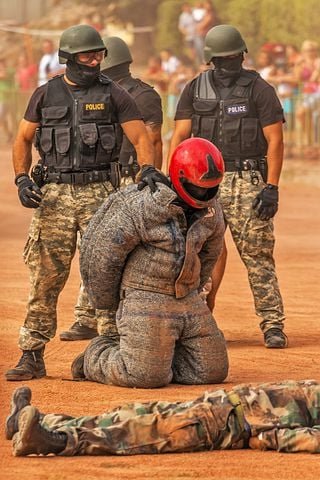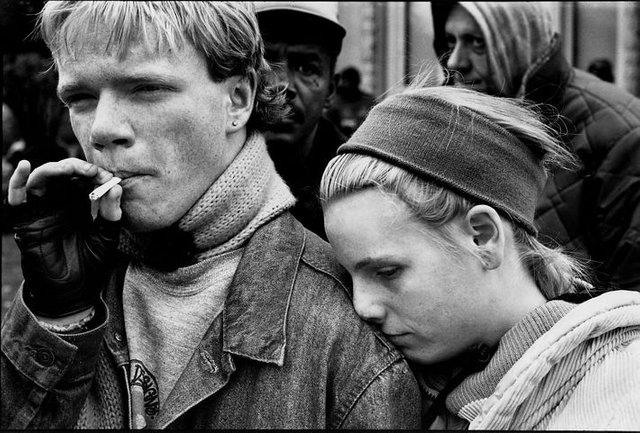Fear and uncertainty rule the day and the night. Fear of vicious thieves, armed robbers, fear of the murderous herdsmen, fear of the unpredictable unknown gunmen, fear of prowling kidnappers preying upon us . Insecurity all over the places. Noone sleeps with both eyes closed or walk the streets without watching his back.
Also, there are none violent economic crimes such as cybercrime ,scamming or obtaining by tricks, alias 419, embezzlement of public funds, etc. Although economic criminals wreak no physical violence, they inflict serious harm to the economy.
New crimes have contributed to emerge day in day out as the society grows and becomes complex and their emergence continue to increase the activities of the crime fighting agencies leading to increasing loss of lives and limbs sometimes in most bizzare questionable circumstances. Usually youths are at the centre of the crimes either as perpetrators or victims and above all wrongly or rightly, the focus of police activities. As a result of the ballooning crime rate in the country, conducts that before were not crime are being criminalized by the legislature while the police apply both orthodox and unorthodox measures to quell crime as a result of pressure. Therefore,it is deemed necessary to do this post in order to get readers to know, get well informed of the consequences of criminal conduct as well as the legal and illegal, orthodox, unorthodox and desperate means that the security agencies often employ to fight crime in Nigeria so as not to fall victim.

The above picture illustrates the police in action.source
What is Insecurity?
In a nutshell, insecurity is a state of uncertainty or apprehension about what may happen to a person. It is fear about one's safety, for example personal insecurity, food insecurity, business insecurity, job insecurity,property insecurity. Insecurity has many aspects and is present in almost everything we do in this contemporary times. In this post, personal insecurity shall be dwelt upon.
.jpg)
Illustration of unsecured person source
Who is a Youth?
A youth is a young person who has not attained adulthood. A youth is fresh, energetic, vigorous and falls between childhood and adulthood. Youthful age is the age of adventure some of which are positive and others negative. Therefore, it is the age at which young persons, if not properly guided, explore the positive and negative tendencies in life which comprises vices such as drugs, alcoholism, cultism, sex in order to get rich quick and enjoy life to the fullest. Such activities may lead to either untimely death, maimed or long time in jail. Such negative youthful tendencies bring them into avoidable conflicts with the law and law enforcement agencies especially the police.
 youths that take drugs.source
youths that take drugs.source
What is the Meaning of Police?
Police as an institution is the civil power of the state that is responsible for detecting, arresting, preventing crime and maintaining public order. In Nigeria it is called Nigeria Police Force. The Nigeria Police Force have different units trained to fight different aspects of crime, for example, the Mobile Police Force, the Counter Terrorism Unit, the notorious Special Anti-Robbery Squared (SARS) etc. The Nigeria Police Force is established by the Constitution of Nigeria as the only single arm bearing civil force of the state that operate accross the Federal Republic of Nigeria. The Constitution of Nigeria does not recognize State Police or Local Government Police.
What Does the Law Say About the Police?
The agency, Nigerian Police Force, is governed by the provisions of the Nigeria Police Act 2020. The document can be obtained from offices of the Clerk of the Senate or House of Representatives, the Government Printer, bookshops and several sales outlets at different high court premises in the cities of Nigeriavat an affordable price. The Act provides for the primary functions and duties of the Nigeria Police Force in section 4(a)-(j) and and also duty to enforce certain constitutional provisions in section 5(1)-(3). The primary functions of the police shall be discussed at this juncture. And others in subsequent posts After discussing the above. The importance of the police as the agency set up to secure lives and property as well as the abuse of their powers and their effect on the security of persons and what people should do to avoid or curb their excessive use of powers shall be discussed. Before that is done ,here are the primary functions of the Nigeria police.
Primary Functions of the Police
The police have powers under the law to perform the following functions:
(a) prevent and detect crimes and protect the rights and freedom of every person in Nigeria as provided in the constitution and the African Charter on Human and People's Rights; This means that the safety of everyone in Nigeria is the responsibility of the police.
(b) maintain public safety, law and order;
This means that in addition to securing Nigerian people, the police also have the power to ensure that there is peace and orderliness. N country can make progress economically, politically, socially and technologically if there is no law and order.
(c) protect the lives and property of all persons in Nigeria; Live is everybody's greatest possession. If it is lost it cannot be replaced.The police is given power under the law to ensure that none attempts to take his life, that noone takes another person's life except as permitted by law.
(d) enforce all laws and regulations without any prejudice to the enabling Acts of other security agencies; Police has general powers to enforce everylaw in Nigeria but in a manner that will not jeopardize the power of other relevant bodies involved in implementation of such other laws.
(e) discharge such duties within and outside Nigeria as may be required of it under this Act or any other law;T police could be deployed to international peace keeping operations or special assignments within the country.
(f) collaborate with other agencies to take any necessary action and provide the required assistance or support to persons in distress, including victims of road accidents, fire disasters, earthquakes and floods; Police can assist sister agencies such as the Economic Financial Crimes Commission ( EFCC), Athe Security and Civil Defense Corp, the Army, the Department of State Security if called upon by such agencies.
(g) facilitate the free passage and movement on highways, roads and streets open to public; Police can control traffic on the road, help in clearing blockade on the highway as well as clear traffic jam,and
(h) adopt community partnership in the discharge of its responsibilities under this Act or under any other law; Intelligence gathering is essential to police work so police can partner with hunters group, vigilantes who are on the grassroots in doing there work and
(I) to vet and approve the registration of private Detective Schools and private Investigative outfits. The police control the registration of organisations that may want to go into the business of security.
From the above it can be seen the police has much powers including enforcement of every law and regulations and that is the reason the police stop and search private cars, tricycles and also pedestrians on mere suspicion to the extent of exceeding their constitutional limits. The said power does not extend to extrajudicial execution. Extrajudicial execution is criminal. Police officer has no power to kill any arrested criminal. You will agree with me that it is at this point that the police kill, abuse, assault and invade suspects rights especially the youths right to privacy in the guise of trying to establish their involvement in cybercrime. When vehicles are stopped, youths are asked to step down to be searched. Sometimes this is also done to some when the work accross police checkpoints. Against ethical rules and the best global practices, their phones and laptops are confiscated and searched and sometimes their persons. Resistance most often results to extrajudicial execution. The practice is not limited to youths but it is perpetrated more against them. The above led to the protest against SARS but rather than abolition SARS was renamed Rapid Respond Squard and the practice has continued. It is just one out of many.
There are other numerous human rights abuses by the police such as torture, extortion, assault, illegal arrest, detention and extra judicial killings being carried out by the very body created to protect us.
Duty to Enforce Certain Constitutional Provisions
In section 5 (1) of the Police Act, the Police have the responsibility for promoting and protecting the fundamental rights of persons in Police custody. This means that some in police custody is still deemed innocent until proven guilty even though his liberty might have been suspended temporarily by virtue of his arrest.
In subsection (2) of the Act the Police shall collaborate with any Government agency or relevant private initiative s in the establishment of schemes or mechanisms
offering legal services to accused persons, detainees or accuser persons in Police custody in need of legal services to ensure that they have full access to justice as laid down under the relevant provisions of chapter 1V of the Constitution and finally; Police should upon request or otherwise assist a suspect in their custody by engaging on his behalf legal practioners or human rights groups who might avail him of legal assistance.
Subsection (3) provided that in addition to the provisions of subsections (1) and (2) of this section, the Police Force is also charged with the responsibility for promoting and protecting the fundamental rights of all persons as guaranteed under the African Charter on Human and People's Rights (Ratification and Enforcement)'Act and other international legal instruments on Human Rights to which Nigeria is a signatory. The constitution of Nigeria in Chapter 4 guaranteed certain basic rights which everyone, every authority including the police must respect. Time has gone when such safety guards were not in our law books.
The Police Act therefore provided for two sets of functions for the Police each of which ranks high in its own way.A breach of any of the functions set out could result to action in court against the police. However on many occasions excessive enforcement actions which hurt people's rights are not enforced at all as a result of ignorance. On some other occassions they are sued successfully but reaping of court judgment may not occur at all. Judgment of court cannot be enforced without the Police and they have most times demonstrated their unwillingness to enforce judgment against the government or itself. In such circumstances people lose hope in the law.
This a convenient point to stop. In the next segment what should be done by any person facing any of the above ugly situation will be discussed . Before we delve into that we shall again first examine the briefly the topic "fundamental human rights"in the 1999 Constitution. Thank you for reading this article and endeavor to read our subsequent post.
We have supported this post. Keep on making great content in our community. Always check @steemalive for community updates. Thank you being an active member.
Downvoting a post can decrease pending rewards and make it less visible. Common reasons:
Submit
Congratulations! This article has been manually curated using our community account. Always publish great content, free of plagiarism and make sure you are participating in club5050, club75 or club100. Congratulations once again, hoping to see your next publication soonest!
Curation by: @focusnow20
For: Steemalive
Note: Always include at least 1 image in your post. You can get free images from www.pixabay.com
Downvoting a post can decrease pending rewards and make it less visible. Common reasons:
Submit